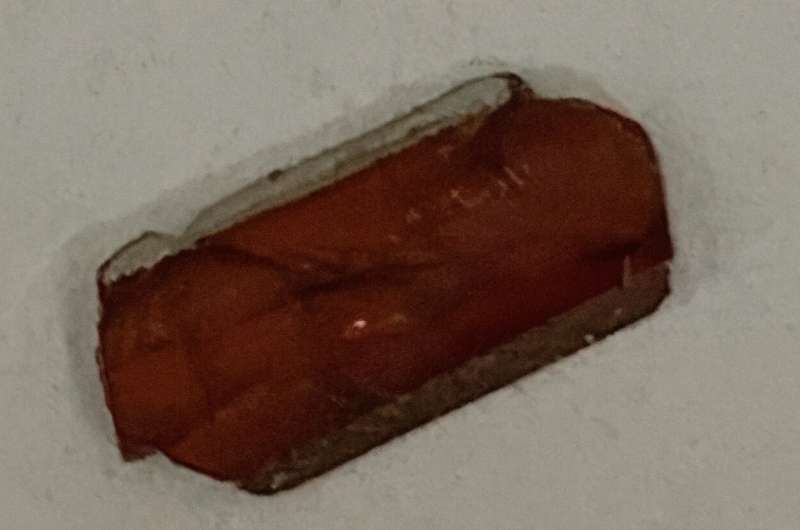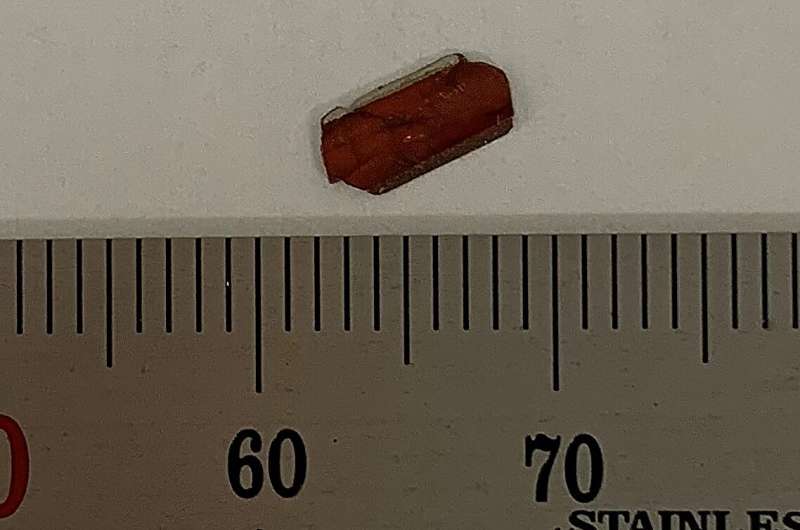September 18, 2023 feature
This article has been reviewed according to Science X's editorial process and policies. Editors have highlighted the following attributes while ensuring the content's credibility:
fact-checked
peer-reviewed publication
trusted source
proofread
Researchers uncover unconventional charge carriers in a triangular-lattice Mott insulator

Mott insulators are a peculiar class of materials with structures that should theoretically conduct electricity, but that are instead insulators. These materials contain strongly correlated electrons, which can generate highly entangled many-body states marked by unconventional excitations.
While many physicists have assumed that a Mott insulator's unconventional excitations can only be observed at low temperatures, a research team at Yonsei University, Rutgers University, KAIST and other institutes in South Korea recently uncovered signatures of these unconventional charge carriers at room temperature. These unconventional charge carriers, outlined in a paper in Nature Physics, were observed in the Mott insulator terbium indium oxide (TbInO3), which has a triangular lattice structure.
"In magnetic materials, as the temperature decreases, the spins of electrons start to interact, eventually leading to ordered states," Prof. Jae Hoon Kim and Prof. Eun-Gook Moon, two of the researchers who carried out the study, told Phys.org. "For example, in the ferromagnetic ground state, all spins are parallel to one another whereas they are anti-parallel in the antiferromagnetic ground state. However, in a quantum spin liquid, the spins remain disordered even at extremely low temperatures due to macroscopic quantum entanglement among them."
A quantum spin liquid is a unique phase of matter first theorized by Nobel Prize winner Philip W. Anderson in 1973, which essentially describes a liquid-like Mott insulator without magnetic orderings. As they were categorized as Mott insulators, many physicists assumed that quantum spin liquids do not interact with external electromagnetic fields and thus optical measurements at room temperature would be unable to detect their unconventional excitations.
"In the early 2010s, a research team led by Professor Patrick Lee at MIT proposed that a class of quantum spin liquids may 'see' external electromagnetic fields indirectly, further predicting that the optical conductivity would be proportional to the square of the frequency at low frequencies," Prof. Kim and Moon explained. "Despite numerous efforts over the last 10 years, quantum spin liquid candidate materials exhibiting this signature characteristic were not found."
As part of their recent study, Kim, Moon and their colleagues set out to challenge the long-standing belief that exotic excitations only exist in Mott insulators at low temperatures. To achieve this, a part of their collaboration grew high-quality single-crystals of the Mott insulator TbInO3 inside Prof. Sang-Wook Cheong's laboratory at Rutgers University, using a technique known as laser floating-zone growth.

The team specifically selected TbInO3 because previous studies by Prof. Cheong and his colleagues had captured unique signatures in this material using neutron scattering techniques, which indicated that it exhibited quantum spin liquid behavior. After the researchers had grown their TbInO3 samples at Rutgers, these samples were analyzed at Yonsei University in South Korea, using terahertz time-domain spectroscopy techniques.
During these experiments, Prof. Kim and his team at Yonsei University observed that the a.c. terahertz conductivity in the material is precisely proportional to the square of the frequency of light, even at room temperature. Finally, Professor Eun-Gook Moon at KAIST devised a series of theoretical interpretations that could explain these surprising experimental observations.
"The most notable finding of our work is the discovery of unconventional charge carriers, made of a macroscopic number of quantum spins," Prof. Kim and Moon said. "In contrast to the common belief that charge carriers do not exist at low energy in an insulator, we prove the very existence of charge carriers by measuring the optical conductivity proportional to the square of the frequency of light. More surprisingly, the charge carriers even survive and are coherent up to room temperature."
Prof. Kim, Prof. Moon, Prof. Cheong and their collaborators experimentally demonstrated that unconventional charge carriers could also be found in Mott insulators at room temperature. Their work could soon pave the way for further experiments and theoretical physics studies, which could shed further light on the physics underpinning their observations.
"One plausible scenario is that the charge carriers come from a class of quantum spin liquids proposed by Prof. Lee," the researchers said.
Prof. Kim suggests that quantum spin liquids possess highly entangled states macroscopically and that these states are inherently embedded in them. He thus anticipates that the exploration of the profound physical principles underlying quantum spin liquid states could ultimately contribute to the realization of fault-tolerant quantum computers that operate even at room temperature.
"Overall, we plan to extend our research to other indium oxide compounds and search for similar effects," the researchers added.
More information: Taek Sun Jung et al, Unconventional room-temperature carriers in the triangular-lattice Mott insulator TbInO3, Nature Physics (2023). DOI: 10.1038/s41567-023-02174-5.
Journal information: Nature Physics
© 2023 Science X Network





















